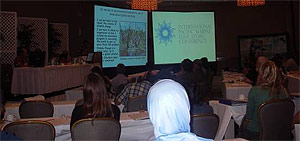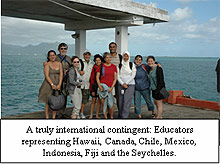 |
International Pacific Marine Education Conference
Australian MESA members have been associated with international networking in marine education since 1990. One key outcome from this international networking is that Australia is now a leader in the rapidly developing network of marine educators around the Pacific Ocean.
The International Pacific Marine Educators Conference (IPMEC), held in Honolulu, Hawaii, in January 2007 was an important step in this process. For more details read the following reports and the article (below) by Andrew Vance.
• IPMEC Background (pdf)
• IPMEC 2007 Press Release (pdf)
Future Pacific Marine Educators conferences are being planned and other aspects of the developing network are taking shape. Contact Andrew Vance (IPMEC Organising Committee 2007-2008) Andrew.Vance@mgc.edu.au or Harry Breidahl (MESA International Committee Convener) nautilused@optusnet.com.au for further details. |
MESA to join alliance of Pacific marine educators
Andrew Vance
IPMEC isn’t the most inspired acronym I have ever heard of; in fact it rather sounds like something you may swallow to bring up something you shouldn’t have drunk, but as a conference, IPMEC was definitely awe-inspiring. About 100 marine educators from 18 countries participated in the International Pacific Marine Educators Conference that kicked off Monday, Jan. 15, at the Ala Moana Hotel in Honolulu.
Representing MESA was myself (2006 Victorian representative) and Harry Breidahl (convener of MESA International Committee). I was there to drum up support for the 2008 Youth Coastal conference and presented on the success of the 2006 event and Harry presented on Beachcombing for his gelatinous passions, “the Pacific Ocean Blue Armada”.
Other Australian’s showing their support for the alliance were Leo Dutra, PhD candidate from the University of New England, who presented on Community-Based Coral Reef management in East Timor and Liz Murphy, manager of the World Ocean Forum, who demonstrated some fantastic web-conferencing technology that will help to link up marine educators from around the Pacific to promote best practice environmental education.
Also showing their support at the conference were Jane Breidahl and joining in via the web was Mark Rodrigue, Peter Johnson and the Parks Victoria gang who promoted their education resources for marine protected areas. |
 |
The conference ended Wednesday with the establishment of a Pacific network of marine educators designed to ensure the health of the Pacific and the communities that depend upon it. Below is a summary of the conference written by the conveners. I am proud to be a member of the steering committee for this exciting new alliance and hope that through this network, we can facilitate some real action in marine education and highlight the need for ocean stewardship across the Pacific.
Two speakers opened the conference: Wallace J. Nichols, senior research scientist for The Ocean Conservancy, and research associate, Department of Herpetology, California Academy of Sciences; and Ben Mikaere Namakin, environmental educator for the Conservation Society for Pohnpei.
Nichols discussed OceanRevolution.org, while Namakin, who recently returned from a 15-campus tour of the United States, discussed climate change effects on natural resources and rights in the Pacific.
“Right now on our planet the combination of destructive forces facing our ocean, the expanding network of individuals committed to ocean conservation, the exponential growth in our knowledge of the ocean, and the rich array of communication and sharing tools at our fingertips make the time right for an Ocean Revolution: a fundamental shift in the way we understand and relate to the ocean,” said Nichols.
“OceanRevolution.org was created so youth can evolve and lead the way to a healthier relationship with the ocean. It links young people from all over the world in a growing, collaborative network of information sharing and mentoring by connecting environmental action to their computers.”
Namakin said that Pacific Islanders are blessed with natural resources from land and sea, “and everything we know relies upon them. Climate change is occurring worldwide, and it is having a massive impact on our watersheds, mangroves, rivers and reefs. .As a Pacific youth and environmental educator, what can I do to protect my rights to live with students and unique terrestrial and marine resources? What can we do to mobilize our students and fellow Pacific Islanders to help slow down the threats global warming presents to our local communities, local fishermen and farmers?”
The conference was hosted and sponsored by the Western Pacific Regional Fishery Management Council. It was originally scheduled to be held at and co-hosted by the University of the South Pacific in Suva, Fiji, but was relocated to Honolulu after the Dec. 5 coup in that country.
The webconference and webcast components of the conference were provided by the College of Exploration through the support of the NOAA Ocean Exploration Program and the National Marine Sanctuary Foundation. Funding to support speakers and scholarships to the conference were provided by the National Marine Educators Association and The Ocean Foundation. |
 |
The IPMEC Sustainable Seafood Reception Monday night at Nico's at Pier 38 was co-sponsored by the Western Pacific Regional Fishery Management Council and the World Ocean Network's Sustainable Actions Committee and Concert for the Oceans.
|